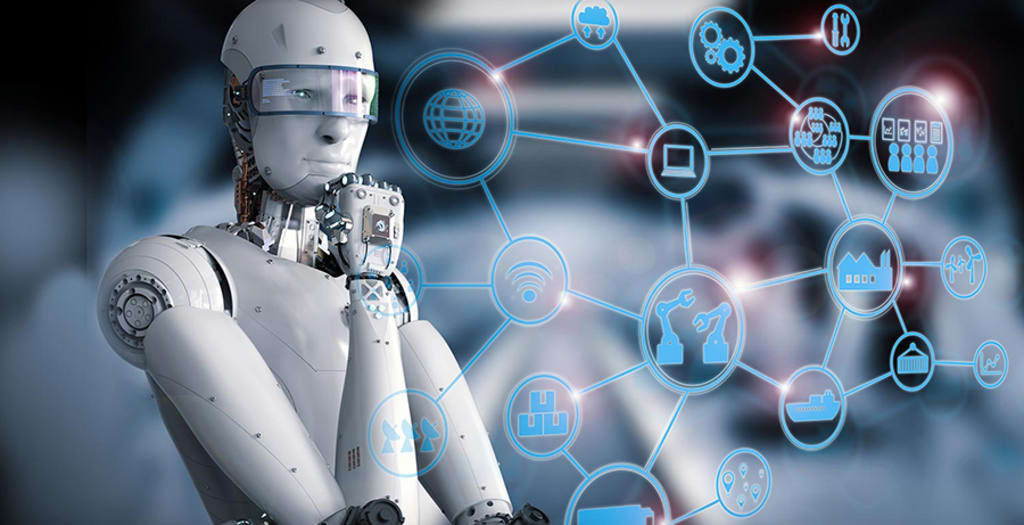TOMORROW'S WORLD AND ARTIFICIAL INTELLIGENCE
TOMORROW'S WORLD AND ARTIFICIAL INTELLIGENCE

TOMORROW'S WORLD AND ARTIFICIAL INTELLIGENCE
Tomorrow's World is a possibility that offers an anticipation of what awaits us in our rapidly advancing day. This topic considers the human lifecycle outputs of artificial intelligence, robotics, biotechnology, space capabilities, and other advanced technologies, and the potential impacts of these technologies.
Artificial intelligence is a technology that enables computers to execute close to human intelligence. The effects of these people on people can be observed in many areas, such as the use of robots in the business world or smart home departments.
Robotics refers to mechanical devices to use to do work in industrial devices. Robots can be made smarter and more functional with the use of artificial intelligence. Robots can also be used in many areas that will directly contribute to the human home, such as family health services.
Biotechnology studies the computations and genetic structures of living organisms. This technology is making great advances in the field of medicine and healthcare. For example, it may be possible to treat human diseases with genetic machinery.
Space mapping refers to exploring the universe using spacecraft and telescopes. The human life consequences of space travel include issues such as space tourism, space colonization, and asteroid mining.
These technological transformations provide insight into what awaits us. However, the possible ethical, economic and social consequences of these technologies are also discussed. For example, there are concerns that artificial intelligence might impede business planning, or that biotechnology is genetic threats.
Tomorrow's World offers an exciting vision of how technological advances can transform human life, while also warning of the societal benefits that are occurring. This topic makes recommendations on what needs to be done to strike a balance between benefits and risks.
ARTIFICIAL INTELLIGENCE
Artificial intelligence is a technology that enables computers to behave similarly to human intelligence. This technology allows computers to perform and learn certain tasks automatically. AI can provide benefits for many different areas, such as:
Automation: AI can save human labor by automating certain tasks. For example, the use of robots on production lines can perform many operations without human intervention.
Data analysis: By analyzing large data sets, AI can get results more quickly and accurately. This technology can especially help businesses understand customer preferences, market trends and business processes.
Personalized experiences: Artificial intelligence can be used to provide a personalized service that is better responsive to customers' needs. For example, shopping sites may offer product recommendations based on customers' preferences.
Medical diagnosis and treatment: Artificial intelligence can be used in medical imaging and diagnostic systems to help diagnose diseases more accurately and prepare treatment plans.
Artificial intelligence technology can provide many benefits to make human life easier. However, there are also some ethical and social issues to be aware of when using this technology. For example, artificial intelligence systems can interfere with people's private lives and limit individual freedoms. In addition, AI algorithms may have biases, which can lead to unfairness, especially in terms of hiring and lending.
AI AND UNEMPLOYMENT
Artificial intelligence technology can cause some work to be automated and reduce the need for manpower. This may cause unemployment in some sectors. However, AI also creates new business opportunities and allows people to be more productive.
For example, artificial intelligence technology can automate work on many production lines with the use of robots that perform some routine tasks. This allows people to focus on more creative, intellectual or managerial work rather than doing those jobs. It can also create job opportunities in areas such as artificial intelligence, data analytics, and high-level computing.
However, there are also concerns that artificial intelligence technology could increase unemployment. In particular, artificial intelligence and automation technologies may affect those working in low-skilled jobs more. Therefore, measures such as training and skills development programs should be taken to prevent unemployment and adapt to the workforce. In addition, ethical and social adjustments must be made to monitor and manage the effects of artificial intelligence technology.
ARTIFICIAL INTELLIGENCE IN THE FUTURE
In the future, artificial intelligence technology may become more common and useful in many areas of our lives. Artificial intelligence technology can be combined with other technologies to make it smarter and more automated.
An example of this is smart home systems and smart cities. These systems make our homes and cities smarter using artificial intelligence technology. For example, smart home systems can make our homes safer and more comfortable and save energy. Smart cities, on the other hand, can better manage traffic flow and protect the environment.
Artificial intelligence technology could also play a big role in the healthcare industry. Artificial intelligence technology can be used in medical diagnosis and treatment systems to help diagnose diseases more quickly and accurately and to prepare treatment plans. In addition, artificial intelligence technology can be used in the development of personalized medical treatments.
Artificial intelligence technology can also be used in industrial production, helping to make production processes smarter and more efficient. This can mean faster, more accurate and cheaper production.
However, there are also some concerns about the future effects of artificial intelligence technology. In particular, artificial intelligence technology can cause unemployment and reduce the need for manpower for some jobs. In addition, artificial intelligence technology can violate human freedoms and privacy. Therefore, it is necessary to make ethical and social regulations during the development and use of artificial intelligence technology.
ARTIFICIAL INTELLIGENCE AS A RESULT
As a result, artificial intelligence technology is used in many areas of our lives today and will become more common in the future. Artificial intelligence technology can make our jobs more efficient, make our lives safer and more comfortable, and help develop better diagnoses and treatments in the healthcare industry.
However, there are also some concerns during the development and use of artificial intelligence technology. Artificial intelligence technology can cause unemployment and violate people's freedoms and privacy. Therefore, it is necessary to develop and use artificial intelligence technology with ethical and social regulations.
In conclusion, although artificial intelligence technology has the potential to make our lives smarter and more efficient, it is a technology that should be handled with care.
About the Creator
Enjoyed the story? Support the Creator.
Subscribe for free to receive all their stories in your feed. You could also pledge your support or give them a one-off tip, letting them know you appreciate their work.





Comments
There are no comments for this story
Be the first to respond and start the conversation.